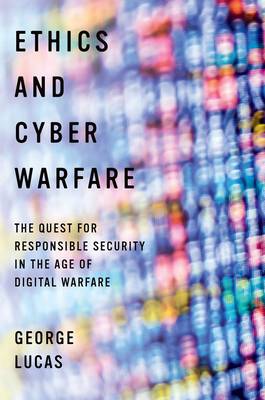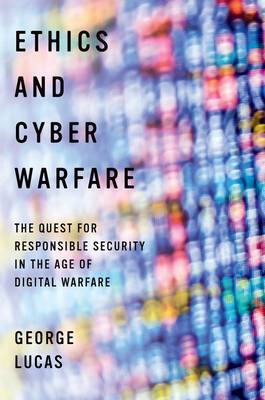
- Afhalen na 1 uur in een winkel met voorraad
- Gratis thuislevering in België vanaf € 30
- Ruim aanbod met 7 miljoen producten
- Afhalen na 1 uur in een winkel met voorraad
- Gratis thuislevering in België vanaf € 30
- Ruim aanbod met 7 miljoen producten
Zoeken
Ethics and Cyber Warfare
The Quest for Responsible Security in the Age of Digital Warfare
George Lucas
Hardcover | Engels
€ 76,45
+ 152 punten
Omschrijving
From North Korea's recent attacks on Sony to perpetual news reports of successful hackings and criminal theft, cyber conflict has emerged as a major topic of public concern. Yet even as attacks on military, civilian, and commercial targets have escalated, there is not yet a clear set of ethical guidelines that apply to cyber warfare. Indeed, like terrorism, cyber warfare is commonly believed to be a war without rules. Given the prevalence cyber warfare, developing a practical moral code for this new form of conflict is more important than ever. In Ethics and Cyber Warfare, internationally-respected ethicist George Lucas delves into the confounding realm of cyber conflict. Comparing "state-sponsored hacktivism" to the transformative impact of "irregular warfare" in conventional armed conflict, Lucas offers a critique of legal approaches to governance, and outlines a new approach to ethics and "just war" reasoning. Lucas draws upon the political philosophies of Alasdair MacIntyre, John Rawls, and Jürgen Habermas to provide a framework for understanding these newly-emerging standards for cyber conflict, and ultimately presents a professional code of ethics for a new generation of "cyber warriors." Lucas concludes with a discussion of whether preemptive self-defense efforts - such as the massive government surveillance programs revealed by Edward Snowden - can ever be justified, addressing controversial topics such as privacy, anonymity, and public trust. Well-reasoned and timely, Ethics and Cyber Warfare is a must-read for anyone with an interest in philosophy, ethics, or cybercrime.
Specificaties
Betrokkenen
- Auteur(s):
- Uitgeverij:
Inhoud
- Aantal bladzijden:
- 208
- Taal:
- Engels
Eigenschappen
- Productcode (EAN):
- 9780190276522
- Verschijningsdatum:
- 13/12/2016
- Uitvoering:
- Hardcover
- Formaat:
- Genaaid
- Afmetingen:
- 155 mm x 236 mm
- Gewicht:
- 453 g

Alleen bij Standaard Boekhandel
+ 152 punten op je klantenkaart van Standaard Boekhandel
Beoordelingen
We publiceren alleen reviews die voldoen aan de voorwaarden voor reviews. Bekijk onze voorwaarden voor reviews.











